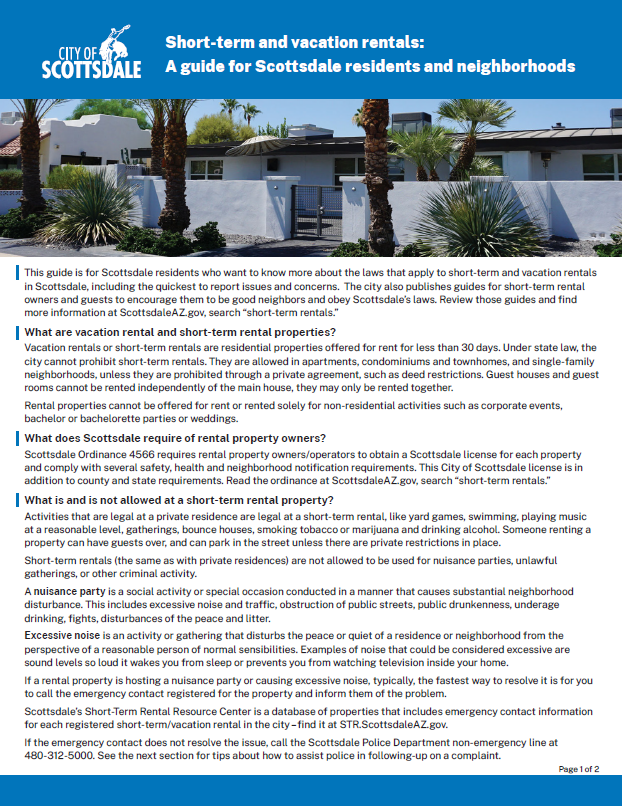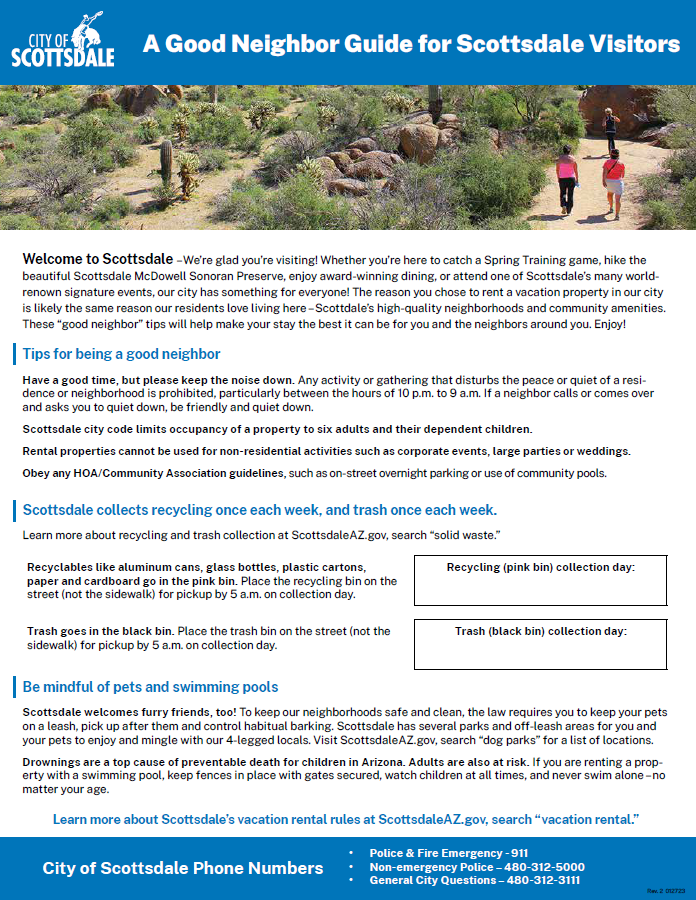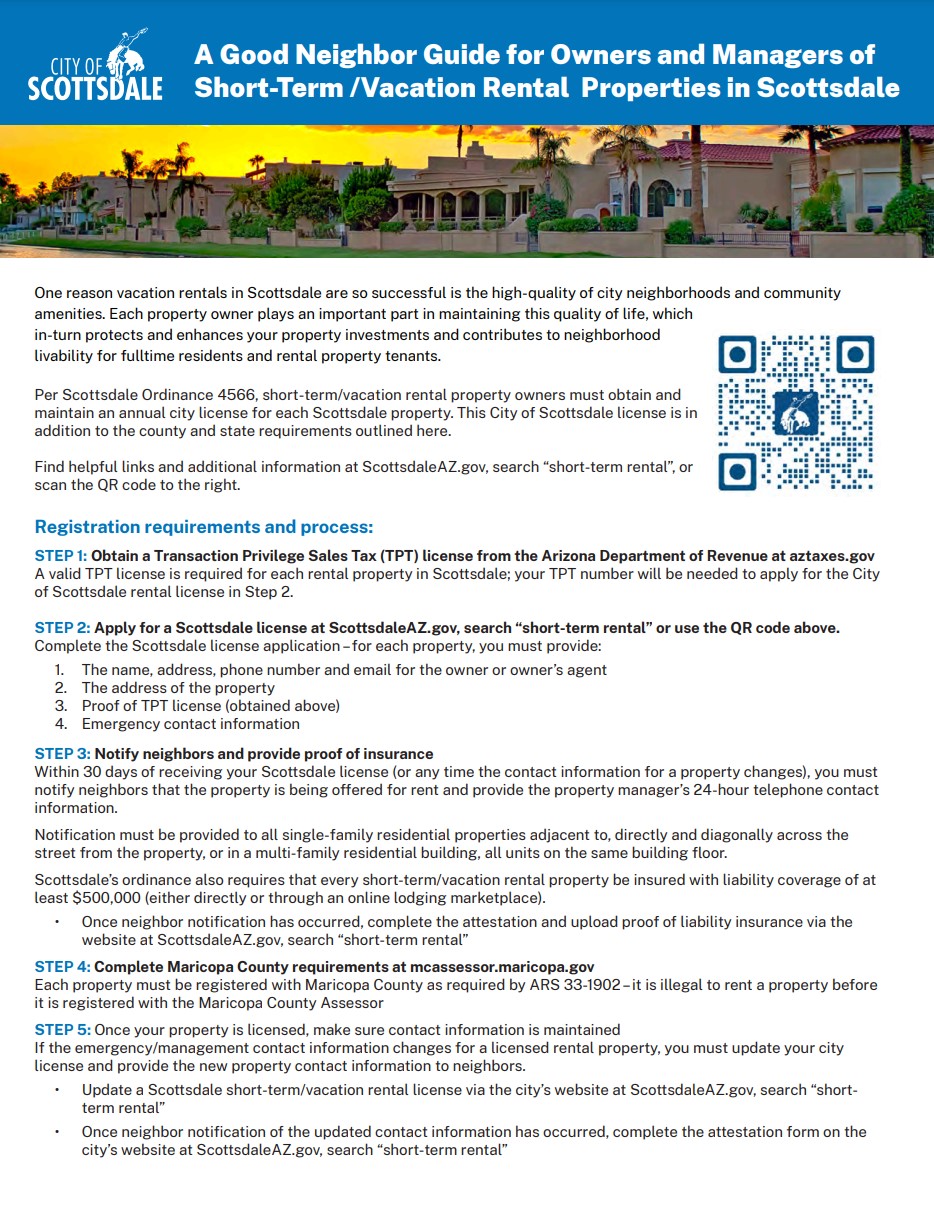All properties offered for rent less than 30 days require a Scottsdale license
Scottsdale Ordinance 4566 requires rental property owners/operators to obtain a Scottsdale license for each property and comply with several safety, health and neighborhood notification requirements.
Scottsdale's Short Term Resource Center map shows the license status of short-term/vacation rentals in Scottsdale.
Information for Residents and Neighborhoods
Some short-term/vacation rental properties present challenges with noise and activity that is disruptive to Scottsdale's neighborhoods. State law severely limits the city's ability to regulate these properties.
What is and is not allowed at a short-term rental property?
The city empathizes with residents dealing with disruptive noise and behavior that can occur at short-term rental properties. However - it's important for residents to understand that:
Activities that are legal at your private residence are also legal at a short-term rental, such as hosting gatherings, enjoying outside activities, playing music at a reasonable volume and using on-street parking (unless there are private restrictions in place).
Short-term rentals (the same as with private residences) are not allowed to be used for nuisance parties, unlawful gatherings, or other criminal activity.
- A nuisance party is a social activity that causes substantial neighborhood disturbance, including excessive noise and traffic, public drunkenness, and disturbances of the peace and litter.
Read Scottsdale's Nuisance Parties & Unlawful Gatherings Ordinance (SRC 18-121) - Excessive noise is an activity or gathering that disturbs the peace or quiet of a residence or neighborhood from the perspective of a reasonable person of normal sensibilities, such as:
- Sound levels so loud it wakes you from sleep
- Sound levels that prevent you from watching television inside your home
What can I do if I’m having an issue with a short-term rental in my neighborhood?
Please note that reporting the same issue in multiple places simultaneously will not generate a quicker response – in fact it can slow the responses as staff work to clarify and collaborate on which issues need to be addressed.
When the people at a rental property are disturbing you through unreasonable noise, illegal parking, or other activity
Contact the rental’s emergency contact or owner. Emergency contact and rental owner information can be found at: STR.ScottsdaleAZ.gov.
If calling the emergency contact does not resolve the problem with behavior of the occupants of a rental property:
Contact the Scottsdale Police Non-Emergency Line at 480-312-5000.
Note: Police calls are prioritized based on the level of immediate emergency. Because nuisance parties and excess noise don’t usually meet the criteria of a high-priority call, it may be a little while before an officer responds.
When a property is operating without a license, or for issues with the property like lighting, overflowing trash, litter, or general maintenance and upkeep
Report property violations online via Scottsdale EZ or call Scottsdale Code Enforcement at 480-312-2546.
Note: Code Enforcement complaints are usually addressed within two business days.
This Good Neighbor Guide for Scottsdale residents and neighborhoods contains helpful information for residents who want to know more about the laws that apply to short-term and vacation rentals.
Within the confines of state law, the city continues its work to mitigate the negative impacts of some rental properties. See More information about Short-term/Vacation Rentals.
Licensing and Information for Owners and Operators
City
Short-term/vacation rental owners must obtain and maintain an annual city license for each Scottsdale property. The annual license fee is $250 per property; funds received will go 100 percent to cover costs associated with licensing vacation and short-term rentals. This license is in addition to the county and state requirements outlined in the sections below.
Scottsdale's licensing portal will open Nov. 28, 2022, and owners of existing short-term/vacation rental properties must obtain licenses by Jan. 8, 2023. New short-term/vacation rental properties must also comply with ordinance requirements and be licensed before being offered for rent in Scottsdale.
Note: The city's license described here applies only to rentals of less than 30 days. Owners that rent for 30 days or longer do not need to obtain a City of Scottsdale license through this process.
Pool Barrier Requirements
In an effort to prevent drownings and keep residents and rental guests safe, Scottsdale has implemented barrier requirements for short-term/ vacation rental properties that include a pool, hot tub or spa.
Learn more about pool barrier requirements for Short Term Rentals
Step 1: Obtain a Transaction Privilege Sales Tax (TPT) license from the Arizona Department of Revenue (ADOR)
A valid TPT license is required for each rental property in Scottsdale; your TPT number will be needed to apply for the City of Scottsdale rental license in Step 2.
Step 2: Apply for a Scottsdale license (required for each property)
Step 3: Notify neighbors and provide proof of insurance
Within 30 days of receiving your Scottsdale license (or any time the contact information for a property changes), you must notify all single-family residential properties adjacent to, directly and diagonally across the street from the property, or in a multi-family residential building, all units on the same building floor.
The Neighbor Notification letter must include the short-term rental license number, the physical address of the short-term rental, and the name, address, and twenty-four (24) hour telephone number of the emergency point of contact for the rental.
Scottsdale's ordinance requires that every short-term/vacation rental property be insured with liability coverage of at least $500,000 (either directly or through an online lodging marketplace).
Once neighbor notification has occurred:
Step 4: Complete Maricopa County requirements
Each property must be registered with Maricopa County as required by ARS 33-1902 - it is illegal to rent a property before it is registered with the Maricopa County Assessor.
Step 5: Generate and Display the Required Short Term Rental Notice
Generate the Required Short Term Rental Notice and display it as defined in Sec. 18-175. (h).
Sec. 18-175. (h): The following notice must be completed in 14-point or larger bold font, on a laminated or otherwise similarly shielded paper, and prominently displayed on the inside of the front door and the primary door to the backyard or a conspicuous location near each such door. The notice shall include information regarding the location of any fire or life safety equipment such as fire extinguishers, and the City of Scottsdale nuisance waste disposal regulations.
Generate a Short Term Rental Notice
Maintenance:
Once your property is licensed and neighbor notification has occurred, make sure contact information is maintained.
County
All rental units, including vacation and short-term rentals, shall file with Maricopa County, prior to being occupied, the information required by ARS 33-1902.
It is illegal to rent a property before it is registered with the Maricopa County Assessor.
State
All Vacation Rentals and Short-term rentals have a Transaction Privilege Sales Tax (TPT) and a Transient Tax liability. A Transaction Privilege Sales Tax license with the State of Arizona Department of Revenue is required. Be sure to list Scottsdale (SC) as a region code on your license.
Download Good Neighbor Guides
Nuisance Parties & Unlawful Gatherings
Under Scottsdale's Nuisance Parties and Unlawful Gatherings ordinance, property owners are accountable for repeated unruly gatherings or parties. This ordinance applies to all private residences whether they are long- or short-term rentals, or owner occupied.
More information about Short-term/Vacation Rentals
Vacation rentals or Short-term rentals are dwelling units for a rental term of less than 30 days to transient guests. They are considered the same as traditional dwelling units and are allowed by-right in all residential districts, subject to the following:
- All Dwelling units and any accessory guest houses must be rented or offered for rent together and may not be rented or offered for rent independently.
- All Dwelling units, including Vacation Rentals and Short-term rentals shall have a maximum family size of 6 adults (and their related dependent children).
- Non-residential uses, including retail, restaurant, banquet space, event center, or other similar use is prohibited.
Short-Term Rentals in Your Neighborhood
Join representatives from Tax & License, Code Enforcement and the Scottsdale Police Department for a discussion of the steps to follow if you have a concern with a short-term rental in your community. Learn about Scottsdale's new ordinance and how it's being enforced.
Recorded January 2023
FAQ
- What is a vacation or short-term rental?
Vacation rental or short-term rental means any individually or collectively owned single-family or one-to-four-family house or dwelling unit or any unit or group of units in a condominium, cooperative or timeshare, that is also a transient public lodging establishment or owner-occupied residential home offered for transient use (offered for rent for less than thirty days.) These types of rentals can be found in both single family and multi-family housing throughout Scottsdale.
Vacation rental and short-term rental do not include a unit that is used for any nonresidential use, including retail, restaurant, banquet space, event center or another similar use.
- Are vacation or short-term rentals allowed in Scottsdale?
In 2017, Arizona State Legislature enacted A.R.S. §9-500.39 which eliminates the ability for local cities and towns including Scottsdale to regulate these types of rentals based solely on their classification or use. Consequently, these rentals are allowed, by state law, in Scottsdale. However, A.R.S. §9-500.39 does not preclude the ability for Homeowner Associations to regulate or restrict these types of uses.
- Are vacation or short-term rentals allowed in every neighborhood?
Except in neighborhoods where Homeowner Associations restrict or regulate these types of rentals, vacation or short-term rentals are allowed by-right in all residential neighborhoods in Scottsdale, subject to the following:
- All dwelling units and any accessory guest houses must be rented or offered for rent together and may not be rented or offered for rent independently of one another.
- All dwelling units, including Vacation Rentals and Short-term rentals, shall have a maximum family size of 6 adults (and their related dependent children).
- Non-residential uses, including retail, restaurant, banquet space, event center, or other similar uses are prohibited.
- All rental units, including vacation and short term rentals, must be registered with Maricopa County, in accordance with ARS 33-1902.
- The owner of a vacation rental must provide to the City of Scottsdale the name and contact information of a person designated as an emergency contact, as well as contact information for owner or owners designed for responding to complaints.
- Do vacation or short-term rentals pay tax to the city?
Yes. All vacation and short-term rentals in Scottsdale are required to pay both Transaction Privilege Sales Tax and a Transient Tax (commonly referred to as a bed tax) – both of which are collected by the State of Arizona. In order to engage in, or continue a property rental business, a Transaction Privilege (Sales) Tax license with the State of Arizona Department of Revenue is required. It is the property owner's responsibility to make an application and obtain a license with the Arizona Department of Revenue. For more information on this requirement, visit ScottsdaleAZ.gov and search “Taxes” or call 480-312-2400.
- Where does this tax go?
The City of Scottsdale imposes a 1.75% Transaction Privilege "sales" tax. Privilege tax revenues are used to finance the cost of various City services including but not limited to police, fire, parks, libraries, and streets.
Half of the revenue derived from the five percent Transient Tax imposed on properties used as a vacation or short-term rental is used for destination marketing to promote tourism in Scottsdale, and the remaining half is divided among tourism-related event support, research, capital projects, and other eligible uses as determined by city ordinance and state law.
- How do I know if a property in my neighborhood is used as a vacation or short-term rental?
Arizona state law requires that an owner of any type of residential rental property register with the Maricopa County Assessor's Office. The city maintains this information at str.ScottsdaleAZ.gov. Please recognize that this rental property registry is for all types of rentals and does not distinguish between long term and short term or vacation rentals.
- What if a rental property does not have contact information but I am aware of rental activity?
Please submit to Code Enforcement at ScottsdaleAZ.gov/EZ so that the city can work with the property owner or agent to ensure the contact information is collected per City Code requirements.
- How can vacation or short-term rental operators and renters be good neighbors?
Scottsdale has developed this helpful guide for owners and managers of short-term and vacation rental properties in Scottsdale to help them understand the city's regulations and manage their property in a way that is least disruptive to neighborhoods:
In addition, the city has created a good neighbor guide for people staying at short-term/vacation rental properties in Scottsdale, and requests that owners/operators provide this guide at rental properties:
- What are the city's responsibilities with vacation or short-term rentals?
The City's ability to regulate vacation or short-term rentals is limited to protecting the public health and safety in accordance with Arizona law as well as to ensure that property owners register their rentals and the appropriate tax is collected for this type of commerce.
- If the city can't regulate short-term rentals, can my neighborhood prohibit them privately?
Neighborhoods may be able to regulate short-term rentals through voluntary private agreements made between neighbors. These agreements, commonly referred to as private deed restrictions, are regulations that the City is not a party to nor can it enforce them or provide advice on how to implement them.


